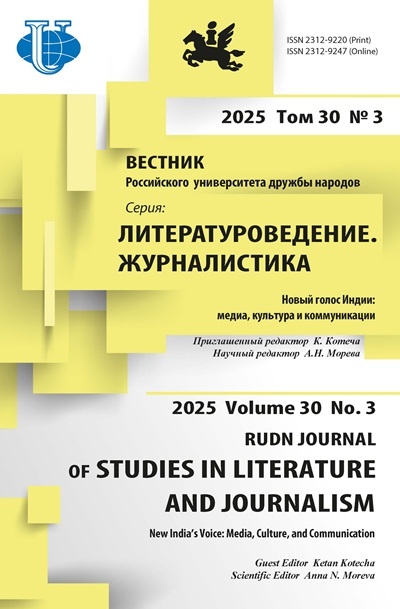«Нагрянула зима истории...»: концепция времени в стихотворениях В. Кривулина
- Авторы: Хайрулин Т.П.1
-
Учреждения:
- Санкт-Петербургский государственный университет
- Выпуск: Том 25, № 1 (2020)
- Страницы: 58-67
- Раздел: Литературоведение
- URL: https://journals.rudn.ru/literary-criticism/article/view/23608
- DOI: https://doi.org/10.22363/2312-9220-2020-25-1-58-67
- ID: 23608
Цитировать
Полный текст
Аннотация
Статья посвящена проблеме историзма в текстах ленинградского неофициального поэта и критика Виктора Кривулина. Новизна исследования заключается в попытке рассмотреть поэтическую историософию Кривулина в контексте «религиозного возрождения» 1970-х годов в СССР. Такой подход позволяет не только определить специфику образов времени в произведениях Кривулина, но и наметить контуры интеллектуальной истории советской неофициальной культуры. Особое внимание уделено эсхатологическим мотивам в произведениях Кривулина, а также противопоставлению «горизонтального» и «вертикального» типов времени. Повседневная реальность, с ее размеренным течением событий, подчиненных хронологическому порядку, преодолевается в текстах Кривулина выходом в сакральную сферу культуры, где творческий диалог с литературными предшественниками наделяется особым ценностным статусом. Именно культурное сотворчество позволяло неофициальному поэту выйти за рамки статичного позднесоветского опыта и заново обрести свою идентичность. Установлено, что образы времени в текстах Кривулина связаны с христианской эсхатологией, которая предполагает конечность исторического бытия. Наиболее отчетливо это проявилось в трансформации образа Ленинграда, представшего в произведениях Кривулина как «город-призрак», в котором остановилась история.
Ключевые слова
Об авторах
Тимур Павлович Хайрулин
Санкт-Петербургский государственный университет
Автор, ответственный за переписку.
Email: khairulin25@gmail.com
соискатель кафедры истории русской литературы филологического факультета
Российская Федерация, 199034, Санкт-Петербург, Университетская набережная, 7-9Список литературы
- Стратановский С.Г. Памяти Кривулина // Полилог. 2011. № 4. С. 134-136.
- Кривулин В.Б. Воскресные облака. СПб.: Пальмира, 2017. 232 с.
- Седакова О.Б. Кривулин. Очерки другой поэзии. URL: http://www.olgasedakova.com/ Poetica/247 (дата обращения: 25.05.2018).
- Кривулин В.Б. Охота на Мамонта. СПб.: БЛИЦ, 1999. 334 с.
- Кривулин В.Б. Охота на Мамонта. СПб.: БЛИЦ, 1998. 333 с.
- Элиаде М. Очерки сравнительного религоведения. М.: Ладомир, 1999. 488 с.
- Кривулин В.Б. Полдня длиной в одиннадцать строк // Часы. 1977. № 9. С. 233-255.
- Zitzewitz J. Poetry and the Leningrad Religious-Philosophical Seminar 1974-1980: Music for a Deaf Age. Cambridge, 2016. 234 p.
- Сурат И.З. Мандельштам и Пушкин // Новый мир. 2003. № 11. URL: https://magazines. gorky.media/novyi_mi/2003/11/mandelshtam-i-pushkin.html (дата обращения: 19.10.2019).
- Булгаков С.Н. Православие. Очерки учения православной церкви. Париж: YMCAPress, 1964. 403 с.
- Кривулин В.Б. Белый свет над Черной речкой // Вестник литературы. 1992. № 4. С. 203-224.
- Кацис Л.Ф. Апокалиптика «Серебряного века» (эсхатология в художественном сознании) // Человек. 1995. № 2. С. 143-154.
- Кривулин В.Б. Золотой век самиздата // Самиздат века. М. - Минск: Полифакт, 1992.
- Бродский И.Б. Сочинения: в 7 т. Т. 1. СПб., 2001. 304 с.
- Кривулин В.Б., Горичева Т.Г. Евангелические диалоги // 37. 1976. № 3. С. 3-9.
- Мильчина В.А. Типы исторического мышления: презентизм и формы восприятия времени // Отечественные записки. 2004. № 5. URL: http://www.strana-oz.ru/ 2004/5/tipy-istoricheskogo-myshleniya-prezentizm-i-formy-vospriyatiya-vremeni (дата обращения: 23.09.2019).
- Кривулин В.Б. Поэзия - это разговор самого языка: интервью // НЛО. 1995. № 14. C. 223-233.
- Козеллек Р. «Пространство опыта» и «горизонт ожидания» - две исторические категории // Социология власти. 2016. № 2. С. 149-173.
- Кривулин В.Б. Шмон // Вестник литературы. 1990. № 2. С. 5-64.
Дополнительные файлы















